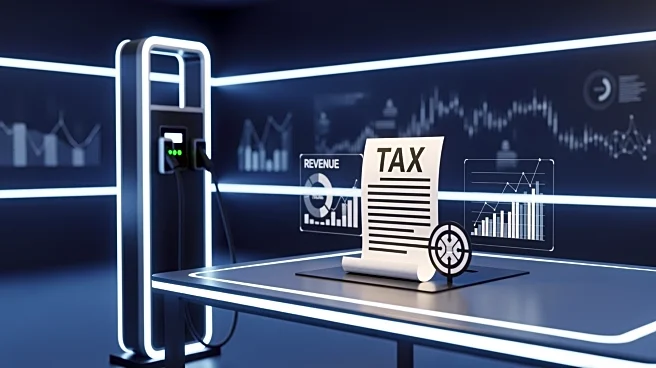What's Happening?
The government is contemplating the introduction of a new tax on electric vehicle (EV) drivers as part of the upcoming Budget. This potential levy aims to address the revenue shortfall caused by the transition
from petrol and diesel vehicles, which currently contribute to government funds through fuel duty. The proposed system would require EV owners to estimate their annual road usage and pay accordingly, with adjustments made at the end of the year based on actual mileage. This move follows the removal of vehicle excise duty exemptions for electric cars earlier this year. The government has expressed a desire to create a fairer tax system that supports infrastructure and public services while continuing to back the transition to electric vehicles.
Why It's Important?
The proposed tax on EV drivers is significant as it highlights the financial challenges governments face with the increasing shift towards electric vehicles. As more drivers switch to EVs, the traditional revenue from fuel duties diminishes, creating a 'tax gap' that needs to be addressed to fund public services and infrastructure. This potential tax could impact the affordability and attractiveness of electric vehicles, potentially slowing down their adoption. Stakeholders such as the Society of Motor Manufacturers and Traders and the AA have expressed concerns that such a tax could be detrimental to the EV market, which is crucial for meeting zero-emission targets. The proposal has also sparked political debate, with opposition figures criticizing the timing and fairness of the tax.
What's Next?
The government is expected to continue discussions and consultations regarding the implementation of the proposed tax. Key stakeholders, including automotive industry representatives and political figures, are likely to engage in debates over the potential impact of the tax on EV adoption and the broader implications for environmental goals. The government may also explore alternative measures to support the transition to electric vehicles, such as increasing charging infrastructure and providing incentives to offset the potential cost increases for EV owners.
Beyond the Headlines
The introduction of a pay-per-mile tax on electric vehicles could have long-term implications for transportation policy and environmental strategies. It raises questions about the balance between encouraging sustainable practices and ensuring equitable taxation. The proposal also highlights the need for innovative solutions to fund public services in a changing automotive landscape. As the government navigates these challenges, the outcome could set a precedent for how other countries address similar issues in the future.











